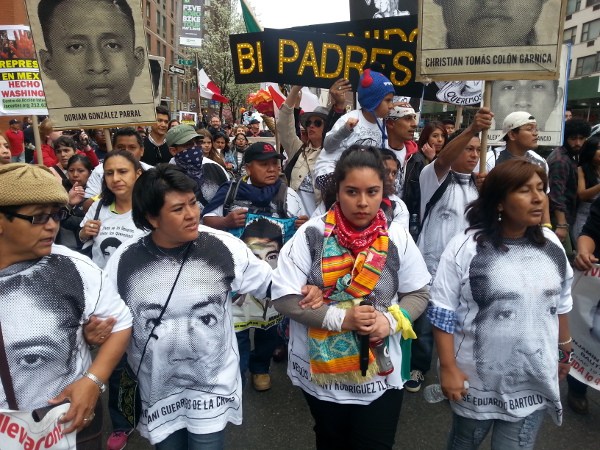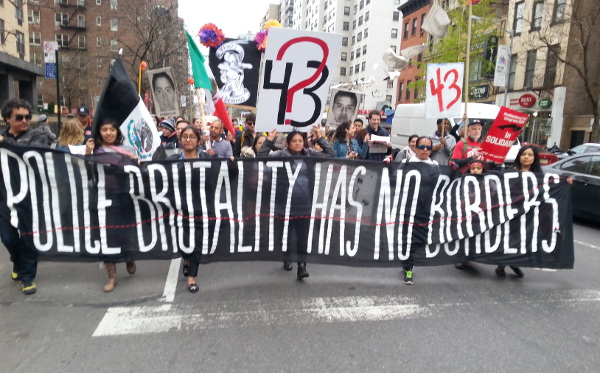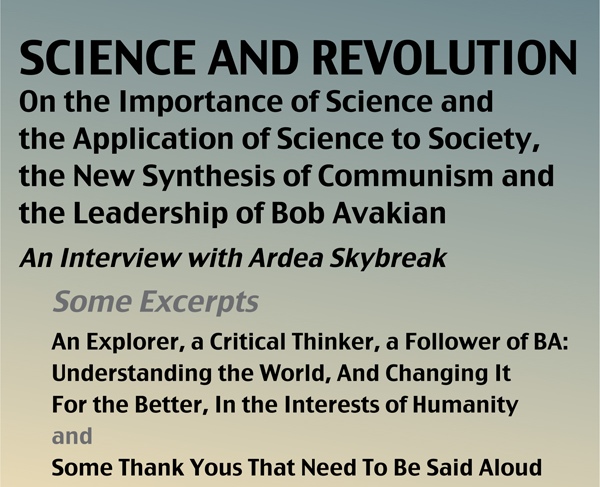Interviews with Two Relatives of Teacher College Students Disappeared in Mexico
April 27, 2015 | Revolution Newspaper | revcom.us
During their travel to New York City, Revolution spoke with relatives of the disappeared students from the Ayotzinapa rural teacher training college in the southern Mexican state of Guerrero. Last September 26, the Mexican police killed six people, wounded 25, and detained 43 students who then disappeared while in the custody of the police and have not been heard from up to this day.
People throughout Mexico and other parts of the world have responded to these murders and disappearances by the state with wave upon wave of outrage and protest. For the last six weeks, two students who survived the attack, along with parents and other relatives of the 43 disappeared, have traveled throughout the United States bringing their story and call for justice to many thousands of people here. The three legs of the Caravana43, as it is called, made stops in some 40 major U.S. cities, including Washington, DC, and have joined in solidarity with the struggle against murders by police in this country. On Sunday, April 26, the Caravana43 took its demands for justice to the United Nations in New York City.
The following are interviews with a father and a sister of two of the disappeared students.
(For more on the recent struggles in Mexico, see “Mexico: ‘The Straw That Broke the Camel’s Back’.” Also see the earlier Interview with Massacre Survivor: Caravana 43 Brings Ayotzinapa Students’ Struggle to U.S.)
Revolution Interview
A special feature of Revolution to acquaint our readers with the views of significant figures in art, theater, music and literature, science, sports and politics. The views expressed by those we interview are, of course, their own; and they are not responsible for the views published elsewhere in our paper.
“The United States supplies the guns and Mexico supplies the deaths.”
Interview with Anayeli de la Cruz Guerrero, sister of Jhosivani de la Cruz Guerrero, one of the disappeared students from Ayotzinapa, Mexico
Revolution: How has your experience here in the United States been?
Anayeli de la Cruz Guerrero: My experience has been good, especially the results, that people, that we—look, when we came here, we didn’t imagine how people would react when we came here to present our case, our issue, but we are happy because there are many people who are with us, not just our Mexican brothers, there are many more people, even people from here, who support us, and we feel the solidarity and support they have shown us.
Revolution: What is the message you have for the world about what happened in Mexico?
Anayeli: Especially get people to see that ... Many people in the population still do not understand that we, they see this case like any old case, but because given this level we are in, there is already so much violence, I don’t think we can go on any longer like this. And they have to, how should I put it, they have to become people with a consciousness that the things that are happening, including what’s happening to us, could also happen to them and it’s time to unite voices, to raise one single voice all together .
Revolution: What do you think is the role of the U.S. in everything that is happening now in Mexico, regarding the disappeared, regarding those killed? What is the role, not of the people, but of the U.S. government?
Anayeli: I think the role of the United States, until now, has not solved anything or it has not gotten involved in anything because the case of the 43 disappeared is not about just right now, it has been going on year after year, and up until now the United States has remained, I think, on the sidelines, because it’s not in its interests that this case becomes known, especially since the U.S. defends all this.
Revolution: As the sister of one of the disappeared, could you say something about what happened...?
Anayeli: I’m Jhosivani’s sister. He is one of 43 Ayotzinapa disappeared by the police on September 26 in Iguala, Guerrero. Regarding the disappearance of the 43 students, clearly we realize that it was the state because year after year they have wanted to get rid of the rural teacher-training school Ayotzinapa because it’s not in the interests of the Mexican government to have this school open, because the students are young people who are very restless and concerned and above all they are very intelligent and capable—they have a very specific goal—to change the world. And this is not in the interests of the government because it knows that it always has under its boot a people who keep their mouth shut, and with these young people, things were changing precisely because they are young, they go to different communities, to the poorest communities, to teach, especially education and get people to open their eyes, so that we will not keep our mouths shut about the many injustices, especially so much impunity on the part of the government. And it is precisely these young people who are disappeared who were doing this work.
Revolution: Could you say something about your brother, who he was, what he was like.
Anayeli: Ah, well, Jhosivani ... We are a community near the school. As a sister, with the love that I have for him, he is a youth like all young people, very restless, but especially with a lot of love for life and his family which is the most important thing, and eager to do something in life and especially eager to just want to change the world.

Seven months after 43 students were kidnapped in Ayotzinapa, Mexico, family members, two students who escaped, and one of their professors toured the U.S. as Caravana43, took their demands to an international audience marching to the United Nations, April 26. Photo: revcom.us
Revolution: What is the connection between the 43 disappeared and others disappeared and murdered in Mexico?
Anayeli: Of course there’s a connection. I don’t know if it’s thanks to the disappearance or due to the misfortune of the disappearance of the 43 students that many people see them as heroes, because they say that thanks to them, the world is realizing what is really happening, and they are the face of the tens of thousands of people that are disappeared.
Revolution: What is the U.S. complicity with the Mexican government in the war against drugs?
Anayeli: Sure. It has to do with the 43 disappeared. Because one of the causes of the Mérida Plan, supposedly, is that United States has strengthened our police in Mexico, right? And that what it is actually doing is strengthening organized crime because they are who run things now. This is the reason why the students are disappeared. And of course the U.S. is complicit because the United States supplies the guns and Mexico supplies the deaths. This is very clear.
Revolution: What would you like to tell the moms and dads of all these young people who are killed by the police? If you could give a message to the parents of all the young people here [in the United States] who have been killed by the police, what message would you give them?
Answer: ...Just like us, basta ya (enough) of so much death, and have courage especially to speak out and denounce the injustices because it’s when you are silent and do not denounce the injustices they carry out or do not denounce the police that, I think, the system of government we have thinks they are untouchable. But I think with the voice of everyone, if we unite, there will be a lot of strength to punish this system, especially the police.
“I, as a parent, I will fight to find him.”
Interview with Clemente Rodríguez Moreno, father of Cristián Alfonso Rodríguez Telumbre, one of the disappeared students from Ayotzinapa, Mexico
Revolution: I want to ask a little bit about what happened to the 43.
Clemente Rodríguez Moreno: My name is Clemente Rodríguez Moreno and my son is Cristián Alfonso Rodríguez Telumbre. After September 26, when the events occurred in Iguala, I went on the 27th to Iguala. When I went there, I began to investigate on my own. I went to the hospitals and I did find some of the compañeros who were injured, one of them had been killed. They had skinned him alive, stripped his skin alive, pulled out his eyes alive. One of the compañeros there was one of the students from the teachers college and when I asked where my son was he told me that he took off running with another. I was gathering information about everything that happened. I went to the army to see what its answer would be. I thought I would get good answers from them. I asked them what had happened to the 43 students and they said we don’t know anything. We didn’t hear anything. How could they be 300 meters away and not know anything, not hear anything? No, they said, from here we didn’t witness anything happen in the street. And I went to the Public Prosecutor’s office as well, since supposedly they [the detained students] should all be there, more than 40 students, graduates—but no. Then I started to look and my son was not there. I started to ask about it. They say: “All the others, all the others that are missing, they were taken by the Municipal Police.” And there are the registration numbers of the patrol cars.
Revolution: And you have not found them since then...
Clemente: ... and now it’s been almost seven months. Seven months we fought, we went on marches, we have done many things. We have even fought the police. Back in Mexico we have been assaulted by them, but I’m not afraid. We have faced off with the Army. They are beginning to see us. But I, as a parent, I will fight to find him.
Revolution: What has been your experience here in the U.S. with the caravan, with the response of people to you?
Clemente: Here in the U.S. I started from McAllen and I’ve been to about 13 cities. I’ve had a lot of experience. Before I came here, I was afraid of how people would respond. But thank God, the people are with us, and we have had conversations with them.
And indeed, we are not alone. We are not alone, and by coming here, it’s been just one step, that we came here, and we let the people know, but you also have to give tasks to organizations, to people, give them tasks, for example, petitions, and to let the U.S. government know they have to stop the Mérida Plan. Another action we been doing with organizations, in society, is that on the 20th of each month we demonstrate to show that the 43 students are alive.
Revolution: You are going to go to the United Nations on Sunday. If you had a message for the world, what is the message you want to give to the world about what is happening in Mexico?

In New York City, family members of the 43 disappeared were joined by three people whose children had been murdered by the NYPD. This deeply felt connection was expressed on a banner that led the march: Police Murder Has No Borders. Photo: revcom.us
Clemente: Well, the message that I would give to the world is this: Do not be fooled by television, rather focus on the 43 disappeared students who are alive, because the television is putting these ideas in people’s head, that the students are already dead, that they burned them in the river, that they burned them in the dump of Cocula. That is the version fed by television. Do not be fooled, because the true story is that, in our own words, the 43 disappeared students are alive. Because we have an expert report from the Argentineans, who took DNA from the majority of parents of the 43 students, that they are alive. And the Mexican government wants to shelve it, to say that it’s all over, but I will keep fighting, I’ll keep fighting with the support of the people.
Revolution: And can you describe your son?
Clemente: Well, my son is 19, is 187 tall [6' 2"]. He likes folk dance, loves to dance, loves agronomy, loves the countryside, loves many things.
Revolution: Why did he go to the school?
Clemente: He went to Ayotzinapa because, as you know, we come from a humble people, a poor people. Therefore, the only option was to go to Ayotzinapa. If I had a lot of money, I would have sent him a better school that requires tuition, but the only option was Ayotzinapa, and for that reason the students were disappeared, because they did not have opportunities, since the parents are peasant people.
Clemente continues: The role [of the Mexican government], I think, instead of taking care of people, instead of caring for society, focuses more on training police, giving them equipment, just disappearing people, killing all over the place. There is evidence, proof, and why aren’t they stopped? Because organized crime is with them. And in terms of organized crime, we have the case of Acapulco, the situation of the teachers, because they were protesting for wages and against the education reforms. They are imposing many things on them. When they were demonstrating, two teachers were raped and a retired teacher was murdered, and the police were not touched at all. That is the role of government, running around killing people.
Revolution: What do you think is the role of the U.S. government?
Clemente: Well, I really don’t know much about the United States, but with the experience I have gotten here, and the people who have approached me—it is the same situation that prevails in Mexico. There is a lot of discrimination, we have the case of the Afro-Americans, the color of the skin, a lot of deportations—what’s happening here is the same. And I think that, as a Mexican, it is the responsibility of all of us, on both sides of the border, to be in communication, because, well, it’s the same situation that we have in Mexico, that we have here in the U.S.
Revolution: A demonstration just took place in which many parents who have lost children here in the U.S. at the hands of the police participated. If you could send a message to the parents who have lost children at the hands of police here in the U.S., what message would you give them?
Clemente: Well, it’s a message of solidarity, more than anything. An embrace of solidarity for them. Because it is not so easy to bear up in this situation, with this burden. But do not despair. Organize, build organization, demonstrate. Do not be afraid of the government. Do not be afraid of the government. I, in particular, am going to keep demonstrating and making demands on the Mexican government. And I’m going to travel around the world if necessary, wherever there is life, wherever there is a human being in the world, I’ll be there.
Volunteers Needed... for revcom.us and Revolution
If you like this article, subscribe, donate to and sustain Revolution newspaper.









